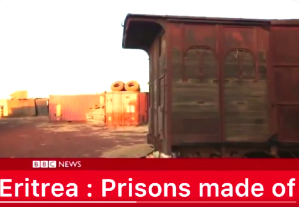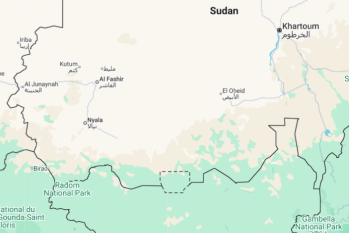
On May 23, 2004, authorities in Eritrea arrested Kiflu Gebremeskel, a church pastor who had earned his Ph.D. in mathematics in Chicago, along with another Eritrean pastor from his Full Gospel Church of Eritrea denomination, Haile Nayzgi.
Twenty years ago today, both pastors are still in prison without trial. They were likely arrested for leading banned congregations, as evangelical churches in Eritrea were closed by decree in May 2002, rights advocates say.
“Pastor Haile Nayzgi and Dr. Kiflu Gebremeskel were arrested for their leadership roles in the Full Gospel Church of Eritrea after the Eritrean government outlawed evangelical Christian churches in 2002,” aid and advocacy group Voice of the Martyrs (VOM) reported in a press statement. “Since then, Nayzgi and Gebremeskel have been held incommunicado for most of their imprisonment, denied access to their families, lawyers and even medical care. It is not clear what physical and psychological abuse they may have suffered in that time.”
Pastor Gebremeskel, a married father of four children, was arrested during an early morning raid on his home in Asmara. The U.S. Commission on International Religious Freedom (USCIRF) believes he is held at Wengel Mermera Central Criminal Investigation Interrogation Center.
At the time of Pastor Nayzgi’s arrest, the Full Gospel Church of Eritrea had 120 to 150 groups meeting for worship in homes, according to VOM.
“Following government closure of all churches other than Orthodox, Lutheran or Catholic, the Full Gospel Church filed an application for government registration,” VOM stated. “Church leaders never received a reply.”
Christians practicing their faith secretly in homes – outside the officially sanctioned Orthodox, Catholic and Evangelical Lutheran denominations, along with Sunni Islam – have been the target of arrest and imprisonment in cruel conditions in Eritrea since 2002.
Eritrean President Isaias Afwerki, who has headed a communist-influenced government since 1994, has imposed a “reign of fear through systematic and extreme abuses of the population that may amount to crimes against humanity,” according to a United Nations panel.
“Eritrea’s leader has turned a deaf ear to the cries of his own people and refused to listen also to those around the world calling for more religious freedom and for the release of Pastor Haile, Dr. Kiflu and hundreds of other imprisoned Christians,” said VOM Vice President Todd Nettleton.
Pastor Gebremeskel was formerly a department and faculty head at the University of Asmara, a founding member of the Full Gospel Church and senior pastor of the Southwest Full Gospel Church. He also served as leader of the Eritrean Evangelical Association.
The two church leaders are among more than 350 other Christians in prison for their faith, including 80 arrested in the first five months of this year, according to VOM, which provides information to email or fax the Eritrean embassy on behalf of imprisoned Christians. Other estimates of Christians in prison in Eritrea range as high as 1,000.
When VOM asked for prayer for imprisoned Christians last July 22, six days later the aid group’ leaders learned from in-country partners that 13 Christian prisoners had been set free – six men and seven women who had been in prison for 10 years.
“I’m saddened that pastors Nayzgi and Gebremeskel were not among those released,” Nettleton said in a statement at that time. “We continue to pray that they will be freed from their prison cells soon, perhaps even as Peter was set free in Acts 12.”
VOM has called on U.S. government and the international community to “use every tool at their disposal to urge the Eritrean government and President Isaias Afwerki to end Eritrea’s terrible persecution of Christians.”
Less than two weeks after pastors Gebremeskel and Nayzgi were imprisoned, Massawa Rhema Evangelical Church Pastor Meron Gebreselasie was arrested for his leadership role with and remains in prison, according to USCIRF. Pastor Ahferom Akilas of the Gospel Light Eritrean Baptist Church in Dallas told the Baptist Standard that a pastor he knew for decades had died after two and a half years in prison. The unnamed, 78-year-old pastor was scheduled to be buried on May 15, Pastor Akilas said.
USCIRF this week urged the White House to address religious freedom violations in Eritrea. Commissioner Frank Wolf, former member of the U.S. House of Representatives, said it was “unconscionable” that the three pastors “remain imprisoned under horrible conditions.”
“According to the Tom Lantos Human Rights Commission in the U.S. House of Representatives, the Eritrean government does not generally take steps to investigate, prosecute or punish officials who commit human rights abuses,” Wolf said. “The safety and well-being of religious prisoners of conscience needs to be a priority for the international community. USCIRF urges the U.S. government to press for their immediate release.”
USCIRF stated in its 2023 report that at least 500 Christians in Eritrea faced “extremely long prison sentences and harsh prison conditions.”
The U.S. Department of State has designated Eritrea a Country of Particular Concern since 2004 for engaging in “systemic, ongoing and egregious violations of religious freedom.” Open Doors’ 2024 World Watch List (WWL) ranked Eritrea, “the North Korea of Africa,” No. 4 among the 50 countries where it is most difficult to be a Christian.
Open Doors estimates 1,000 Eritrean Christians are imprisoned for their faith, none of them charged with a crime.
“Raids to round up ‘unsanctioned’ believers are common, with church leaders particularly targeted,” the group stated in its WWL report. “Those seized in these raids are often sent into Eritrea’s notorious prison network, where they can be detained indefinitely…enduring shocking conditions, including solitary confinement in tiny cells. Women in prison can face gender-based violence, including rape and sexual violence.”





